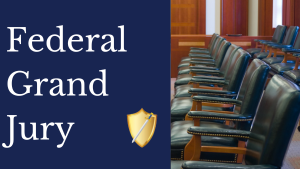

Receiving a federal grand jury summons can be an extremely stressful experience. It often comes out of the blue and leaves you with numerous questions and concerns. If you’ve recently received a grand jury subpoena, you’re not alone. Understanding what this means and how to handle it can significantly impact your future.
Here, we’ll break down what you need to know about federal grand jury summonses. From understanding what they are to consulting a federal criminal defense attorney, we’ll cover all the bases. We aim to help you feel more informed and prepared during this challenging time.
A grand jury summons is a legal document that requires you to appear before a federal grand jury. This jury evaluates whether there is enough evidence to charge someone with a federal crime. It’s essential to understand that receiving a summons does not automatically mean you are guilty or will be charged with a crime.
The grand jury has the power to compel witnesses to testify and produce documents. This makes it a vital part of the federal legal system. If you receive one, it’s crucial to take it seriously and understand its implications.
There are several reasons why you might receive a federal grand jury summons. The most common reason is that the grand jury believes you possess information relevant to their investigation. This could mean you have witnessed something, have documents they need, or have been implicated by another witness.
Receiving a grand jury summons often indicates that you are connected to the case in some way. However, it doesn’t necessarily mean you are the main target of the investigation.
If you receive a federal grand jury summons, immediate action is crucial. Your first step should be to consult with an experienced federal criminal defense attorney. They can guide you through the process and help you understand your rights and obligations.
Failing to comply with a grand jury summons can result in severe consequences, including being held in contempt of court. Therefore, it’s essential to act quickly and seek legal advice.
The subpoena will usually specify the date, time, and place where you are required to appear. It may also list any documents you need to bring. Carefully read the subpoena to understand what is being asked of you.
Your attorney can help you interpret the subpoena and determine the best course of action. They can also communicate with the federal prosecutor on your behalf to clarify any ambiguities.
Preparation is key when it comes to appearing before a federal grand jury. Your attorney will help you prepare your testimony and ensure you understand the questions you might face. They can also provide advice on how to avoid self-incrimination.
It’s important to remember that anything you say can be used against you. Therefore, it’s crucial to speak truthfully and carefully.
During the federal grand jury process, you’ll be asked to testify under oath. A court reporter will record everything you say. The grand jury will consist of 16-23 jurors who will listen to your testimony and ask questions.
Unlike a trial jury, a grand jury’s role is to determine whether there is probable cause to charge someone with a crime. They do not decide guilt or innocence. They may serve for up to 18 months but only need to appear in court for a few days out of every month. And unlike public state criminal court proceedings, federal grand juries convene in secret.
Your attorney will play a critical role throughout this process. While they cannot accompany you into the grand jury room, they can prep you before your appearance. They will ensure you understand your rights and the potential implications of your testimony.
Your lawyer can also negotiate with the prosecutor to limit the scope of your testimony or seek immunity if appropriate.
Testifying before a grand jury carries several risks. If you provide false testimony, you can be charged with perjury. Additionally, anything you say can be used as evidence against you or others.
It’s also possible that your testimony could lead to further investigation or charges. Therefore, it’s essential to approach this process cautiously and under the guidance of your attorney.
There are several possible outcomes after you testify before a federal grand jury. The grand jury may decide there is enough evidence to issue an indictment. Alternatively, they may determine there is insufficient evidence and decline to press charges.
In some cases, the grand jury may request additional information or testimony from other witnesses before making a decision.
Protecting your rights should be your top priority if you receive a grand jury summons. This includes understanding your Fifth Amendment right against self-incrimination. Your attorney will advise you on how to invoke this right if necessary.
It’s also important to understand that you have the right to legal representation throughout this process.
Consulting an experienced federal criminal defense attorney is crucial. They can help you understand your rights, prepare your testimony, and negotiate with the prosecutor. An attorney will also provide invaluable guidance on minimizing the risks and consequences of your testimony.
Not all attorneys are equipped to handle federal grand jury cases. Look for a lawyer with experience in federal criminal defense. They should have a strong track record of representing clients in similar situations.
Ask for recommendations, check online reviews, and meet with potential attorneys to find the best fit for your needs.
Facing a federal grand jury summons can be daunting, but you don’t have to go through it alone. Understanding the process and seeking prompt legal advice are crucial steps in protecting your rights and future.
If you’ve received a grand jury summons, acting quickly and consulting with an experienced federal criminal defense attorneys of Blizzard and Zimmerman Attorneys will help you navigate this challenging time.
Remember, knowledge is power. The more informed you are, the better you can protect yourself.
Stay alert, stay informed, and take action today.